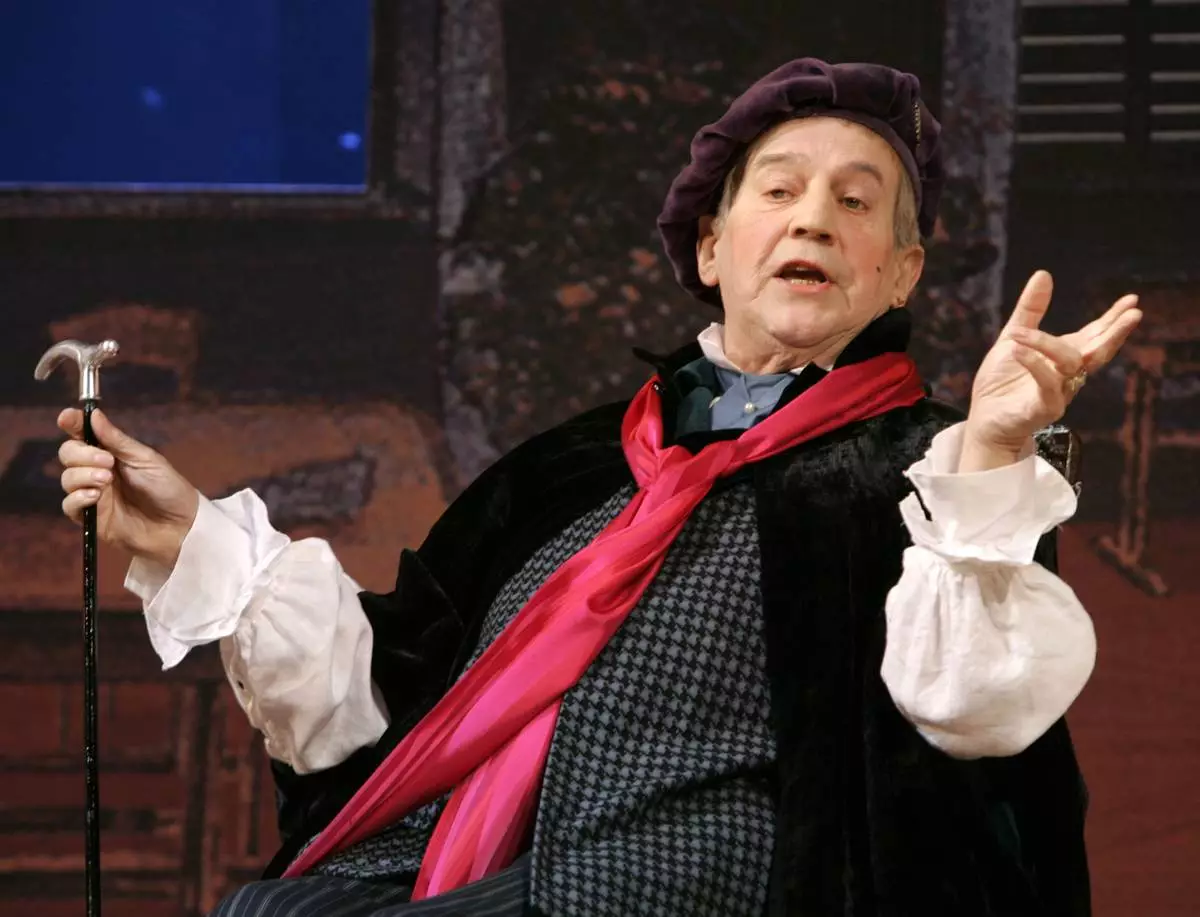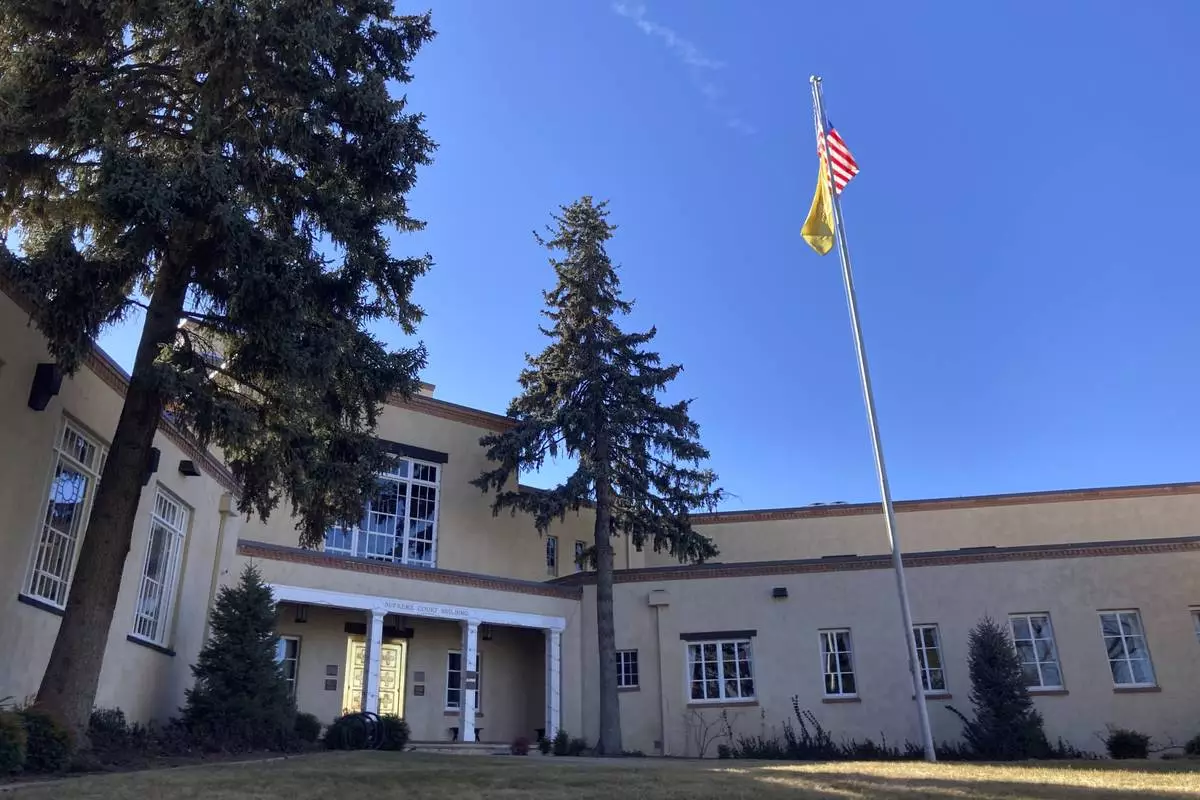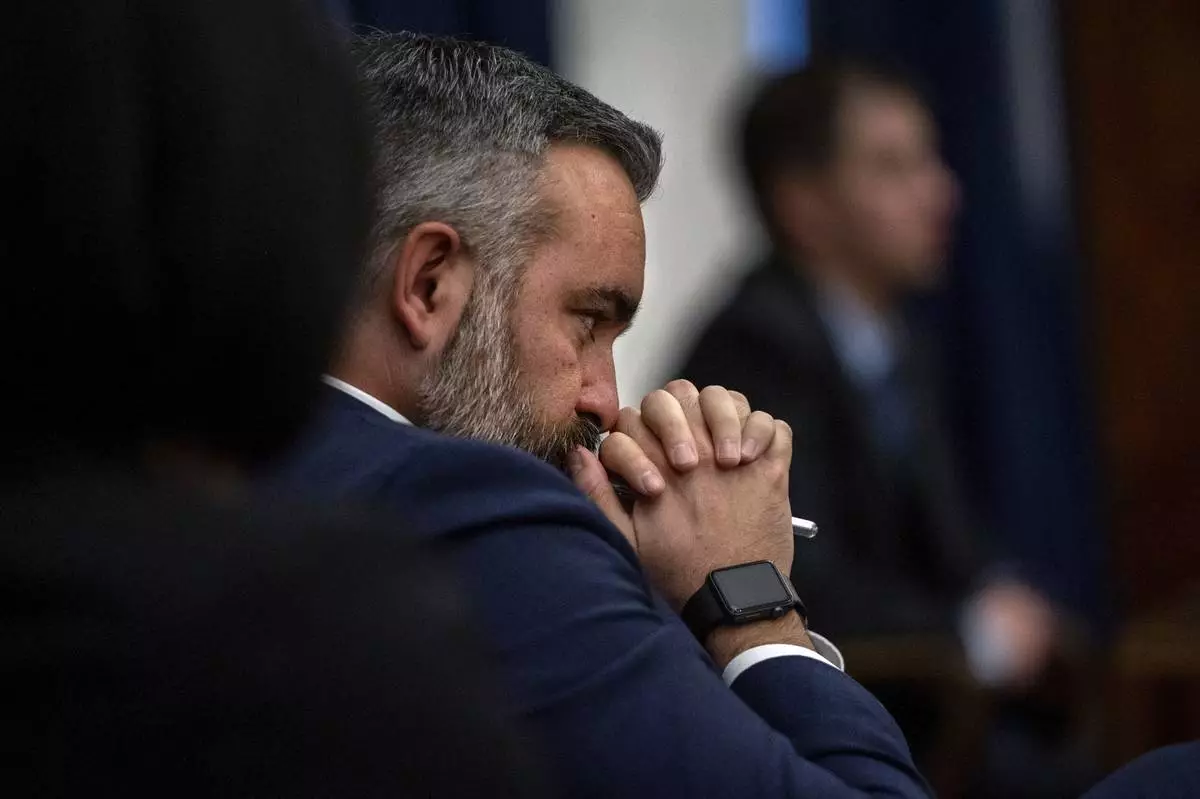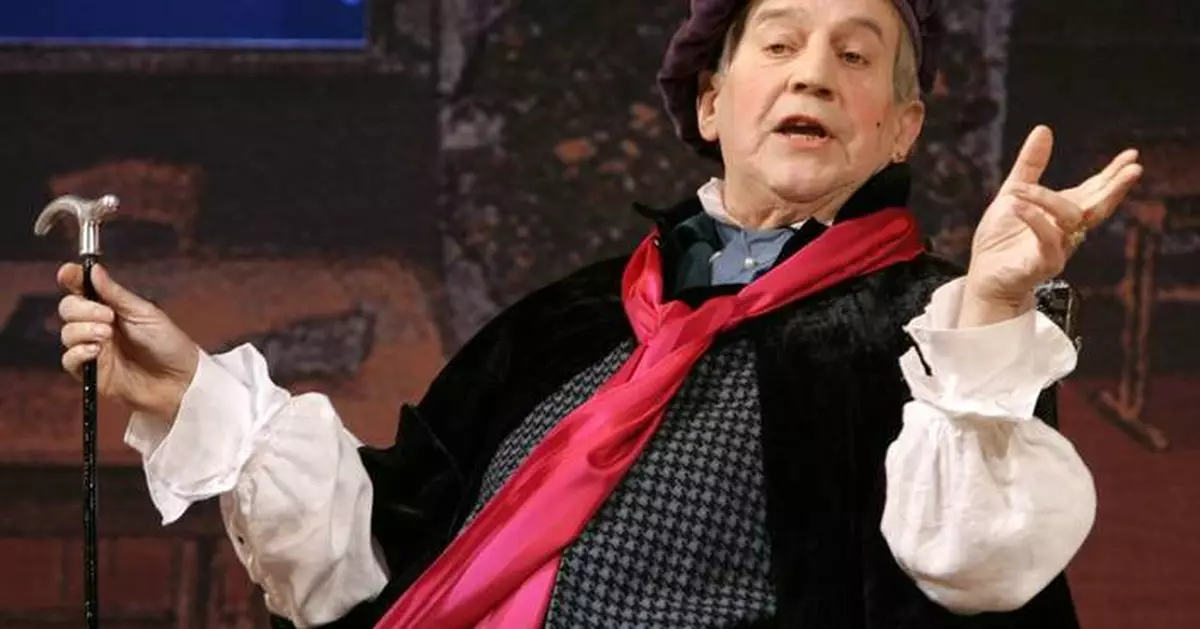Otto Schenk, an actor who became a noted director praised for traditional opera productions and criticized by advocates of contemporary approaches, died Thursday at age 94.
Schenk lived in Austria, and his death was announced by the Vienna State Opera.
He created 31 productions there, starting with Janáček’s “Jenůfa” in 1964 and ending with Janáček’s “The Cunning Little Vixen” in 2014. Many of his creations remain in use, including a 1979 version of Johann Strauss II's “Die Fledermaus” that was streamed around the world on New Year's Eve.
“Otto Schenk is an essential, unforgettable chapter in the history of our theater,” Vienna State Opera Director Bogdan Roščić said in a statement. “But he was also an artist who shaped the world of theater for half a century like few others. As sacred as the theater was to him, he approached the works naturally and fearlessly, drawing on an immense knowledge. An infinite love for the singers went hand in hand with hard, uncompromising rehearsal work and honesty. ”
Schenk led 16 productions at New York's Metropolitan Opera, starting with Puccini's “Tosca” in 1968 and ending with Donizetti's “Don Pasquale” in 1996. His staging of Wagner's four-work “Der Ring des Nibelungen” premiered from 1986-89 and was shown in 20 full cycles from 1989 to 2009 and broadcast on public television in 1990. Schenk received a huge ovation when he took a curtain call after an April 18, 2009, performance of “Siegfried.”
His romantic, realistic staging had set designer Günther Schneider-Siemssen create images of a river, forest and mountains dominated by greens and oranges, and costumes by Rolf Langenfass that evoked the original Ring of the 1876 Bayreuth Festival. It was in a way a response to Patrice Chéreau's centennial Ring at Bayreuth in 1976, set in an industrial age Ring and interpreted by some as Marxist.
“I wanted to tell a romantic old story, like starting with ‘Once upon a time,’” Schenk said during a 1989 interview with The Associated Press. “All the secrets of Wagner’s Ring should be guessed by the audience or found by the audience.”
Born in Vienna, Schenk studied acting at Vienna's University of Music and Performing Arts, began directing in 1953 and led his first opera, Mozart's “Die Zauberflöte (The Magic Flute)," at Salzburg's State Theatre in 1957. He continued to act and performed 237 times at the Salzburg Festival from 1950-97, becoming head of drama there from 1986-88.
“The theater world has lost one of its greatest phenomena, an exceptional artist, a real legend,” current Salzburg Festival artistic director Markus Hinterhäuser said in a statement.
At the Met, his stagings of Offenbach's “Les Contes d’Hoffmann (The Tales of Hoffmann)” and Wagner's “Tannhäuser” in 1977 earned rave reviews, and Met artistic director James Levine picked him to direct a new Ring Cycle plus Wagner's “Parsifal” in 1991 and "Die Meistersinger von Nürnberg" in 1993.
“At a time when many new productions of `Der Ring des Nibelungen' might be more aptly entitled `Der Ringling des Barnum und Bailey,' the Metropolitan Opera’s staging of Wagner’s epic has cast a vote for the notion that maybe, just maybe, the composer knew best," New York Times critic Donal Henahan wrote in 1989. “The Metropolitan’s trend-bucking project has aroused widespread suspicion, even resentment. `Traditional,' `conventional,' `regressive' and `childishly representational' were some of the nicer epithets thrown about in lobbies and in print. ... Even granting the possibility that radical rethinking of Wagner’s works might occasionally stimulate thought about their everyday relevance, a staging that pays honor to the original is a useful counterbalance.”
Met presentations were long dominated by Schenk and Franco Zeffirelli, who had 11 stagings that premiered from 1964-98.
“Together with Franco Zeffirelli, Otto Schenk was one of the two directorial pillars of the Met for several decades," Met general manager Pel Gelb said, adding the Ring "captured the imagination of the nation when PBS scheduled it for national broadcast on four consecutive nights.”
Schenk said he did not look for hidden meanings.
“Wagner in his life gave no indication on what the Ring meant," Schenk told the AP. "He didn’t interpret.”

FILE - Otto Schenk performs in the role of Herr von Ledig performs during a dress rehearsal for Johann Nestroy's "Unverhofft" at the Theater in der Josefstadt in Vienna, on Tuesday, Jan. 15, 2008. (AP Photo/Stephan Trierenberg, File)
SANTA FE, N.M. (AP) — The New Mexico Supreme Court on Thursday struck down abortion restrictions by conservative cities and counties, helping to ensure the state remains a go-to destination for people from other states with bans.
The unanimous opinion, in response to a request from state Attorney General Raúl Torrez, reinforces the state’s position as having some of the most liberal abortion laws in the country.
Attorneys representing the cities of Hobbs and Clovis and Lea and Roosevelt counties had argued that provisions of a federal “anti-vice” law known as the Comstock Act block courts from striking down local abortion ordinances.
But Justice C. Shannon Bacon, writing for the majority opinion, said state law precludes cities and counties from restricting abortion or regulating abortion clinics.
“The ordinances violate this core precept and invade the Legislature’s authority to regulate access to and provision of reproductive healthcare,” she wrote. “We hold the ordinances are preempted in their entirety.”
New Mexico Attorney General Raúl Torrez praised the court’s ruling Thursday, saying that the core of the argument was that state laws preempted any action by local governments to engage in activities that would infringe on the constitutional rights of citizens.
“The bottom line is simply this: Abortion access is safe and secure in New Mexico," he said. "It’s enshrined in law by the recent ruling by the New Mexico Supreme Court and thanks to the work of the New Mexico Legislature.”
New Mexico House Speaker Javier Martínez called access to health care a basic fundamental right in New Mexico.
“It doesn’t take a genius to understand the statutory framework that we have. Local governments don’t regulate health care in New Mexico. It is up to the state,” the Albuquerque Democrat said.
Opposition to abortion runs deep in New Mexico communities along the border with Texas, which has one of the most restrictive bans in the U.S.
But Democrats, who control every statewide elected office in New Mexico and hold majorities in the state House and Senate, have moved to shore up access to abortion — before and after the U.S. Supreme Court overturned Roe v. Wade in 2022, eliminating the nationwide right to abortion.
In 2021, the New Mexico Legislature repealed a dormant 1969 statute that outlawed most abortion procedures as felonies, ensuring access to abortion even after the Roe v. Wade reversal.
And in 2023, Democratic New Mexico Gov. Michelle Lujan Grisham signed a bill that overrides local ordinances aimed at limiting abortion access and enacted a shield law that protects abortion providers from investigations by other states.
In September, construction began on a state-funded reproductive health and abortion clinic in southern New Mexico that will cater to local residents and people who travel from neighboring states.
The new clinic is scheduled for completion by early 2026 to provide services ranging from medical and procedural abortions to contraception, cervical cancer screenings and education about adoptions.
In Thursday's opinion, justices said they "strongly admonish” Roosevelt County, in particular, for an ordinance that would have allowed individuals to file lawsuits demanding damages of more than $100,000 for violations of the county's abortion ordinance.
The provision would have created "a private right of action and damages award that is clearly intended to punish protected conduct,” the court said in its opinion.
Erin Hawley, a vice president at Alliance Defending Freedom, an Arizona-based Christian legal advocacy group, is an attorney who argued on behalf of Roosevelt County in the case. On Thursday, she criticized the court's decision and emphasized its limitations.
“Roosevelt County and other New Mexico localities should be able to enforce ordinances that comply with federal law and protect the lives of their citizens,” said Hawley, the wife of U.S. Sen. Josh Hawley of Missouri. “We're grateful that the New Mexico Supreme Court did not abandon common sense and find a so-called right to abortion in the state constitution.”
It was not immediately clear whether the ruling can be appealed in federal court or influence broader efforts to apply Comstock Act restrictions on abortion. The New Mexico Supreme Court opinion explicitly declined to address conflicts with federal law, basing its decision solely on state provisions.
Austin, Texas-based attorney Jonathan Mitchell, a former Texas solicitor general and architect of that state's strict abortion ban, said he looked forward "to litigating these issues in other states and bringing the meaning of the federal Comstock Act to the Supreme Court of the United States.”
__
Associated Press writer Susan Montoya Bryan in Albuquerque contributed to this report.

FILE - The New Mexico Supreme Court Building is seen, Jan. 9, 2023, in Santa Fe, N.M. (AP Photo/Morgan Lee, File)

FILE - New Mexico Attorney General Raul Torrez listens to oral arguments dealing with local municipalities implementing ordinances restricting abortion, Dec. 13, 2023 in Santa Fe, N.M. . (Eddie Moore/The Albuquerque Journal via AP, file)












